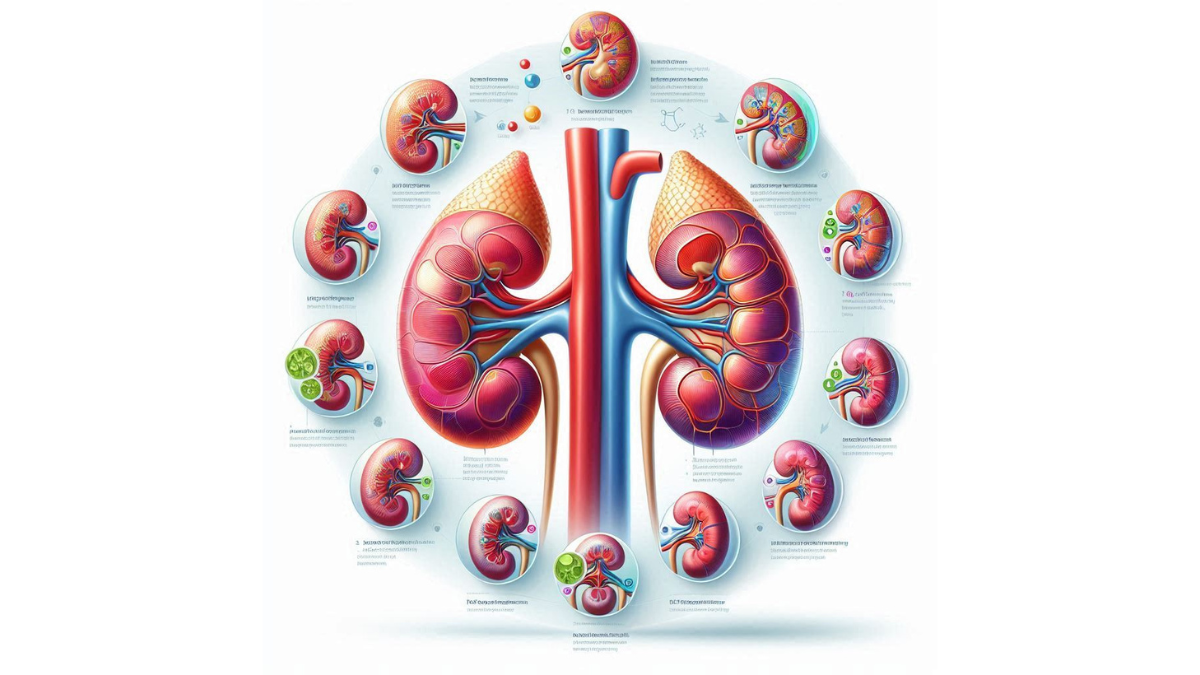Chronic kidney disease stages

Chronic kidney disease stages – Chronic Kidney Disease (CKD) refers to a gradual decline in kidney function over time. This alarming condition means that the kidneys are unable to filter waste and excess fluids from your blood effectively. Consequently, toxins can accumulate, leading to other health issues. Imagine your kidneys as vital filters in a complex engine. If the engine struggles to operate due to clogged filters, it won’t perform efficiently. In the same way, CKD prevents your body from functioning properly. Research indicates that CKD affects millions of people globally. In fact, the Centers for Disease Control and Prevention (CDC) estimates that about 15% of adults in the United States have some level of CKD. It’s essential to understand that CKD is not an instantaneous condition; it often takes years to develop. Early stages may not show symptoms, making regular check-ups crucial for your overall health. So, how do we arrive at this condition? The next section explores the causes and risk factors associated with CKD.
Causes and Risk Factors
Several underlying causes and risk factors contribute to the development of CKD. Being aware of these factors is critical for prevention and early detection. Here are some of the most common:
- Diabetes: This is one of the leading causes of CKD. High blood sugar levels can damage blood vessels in the kidneys, impairing their filtering ability.
- Hypertension (High Blood Pressure): Uncontrolled high blood pressure can put extra strain on your kidneys, further complicating their ability to function.
- Glomerulonephritis: This group of diseases affects the kidney’s filtering units, leading to inflammation and damage.
- Polycystic Kidney Disease: A genetic disorder where fluid-filled cysts develop in the kidneys, ultimately affecting kidney function.
- Other conditions: Chronic conditions such as heart disease, obesity, and smoking can also elevate your risk of developing CKD.
Some lifestyle-related risk factors include:
- Age: Aging increases the likelihood of kidney damage.
- Family history: A family history of kidney disease heightens your risk.
- Ethnic background: Certain populations, including African Americans and Native Americans, show higher rates of CKD.
It’s essential to recognize that while certain factors may be out of your control, lifestyle changes, like maintaining a healthy weight, exercising regularly, and following a balanced diet, can significantly influence your risk. Recognizing these causes and risk factors early on can empower you in managing your health. By understanding CKD’s nature, you can take informed steps towards prevention and gain a better quality of life. As we transition to the next section, we will delve into the various stages of Chronic Kidney Disease, providing a roadmap for understanding this complex issue.
Stages of Chronic Kidney Disease
Stage 1 and Stage 2
Chronic Kidney Disease (CKD) is not a one-size-fits-all condition; it progresses through different stages, each characterized by varying levels of kidney function. Understanding these stages is crucial for managing your health. Stage 1 is often a surprise to those diagnosed. It’s the mildest form, where kidney function is still normal or slightly elevated. You might not even notice any symptoms, which is why it’s frequently discovered during routine blood tests. At this stage, your Glomerular Filtration Rate (GFR)—a measure to evaluate kidney function—remains above 90 mL/min. Nevertheless, being in Stage 1 doesn’t mean you should let your guard down. It’s an opportunity to make lifestyle adjustments to protect your kidneys further. Here are some tips to consider:
- Monitor your blood pressure and blood sugar.
- Stay hydrated but not excessively; consult your healthcare provider for personalized advice.
- Maintain a healthy weight and aim for a balanced diet rich in fruits and vegetables.
Stage 2 continues the trend of mild decline, with the GFR falling between 60-89 mL/min. Though the kidney function is still relatively intact, it may be the last chance to address any underlying issues before more significant problems arise. Symptoms for this stage usually remain absent, but here’s what you can do:
- Regularly check your kidney function with your healthcare provider.
- Engage in healthy lifestyle choices, focusing on diet and exercise.
- Be proactive about managing conditions like diabetes or hypertension.
Stage 3 and Stage 4
As CKD progresses into Stage 3, the situation requires closer attention. This stage is typically divided into two parts: Stage 3a and Stage 3b. In Stage 3a, the GFR is between 45-59 mL/min, while in 3b, it’s 30-44 mL/min. Many patients begin to experience symptoms like fatigue, swelling, and changes in urination patterns. It’s a crucial time for intervention! Here are some common strategies for managing your health during Stage 3:
- Collaborate with your healthcare team for more frequent monitoring.
- Follow a kidney-friendly diet, which may involve limiting sodium and phosphorus intake.
- Keep a close watch on other health conditions that could worsen your kidney health.
Moving into Stage 4 signifies more severe decline, where the GFR drops to between 15-29 mL/min. At this point, symptoms like nausea, muscle cramps, and significant fatigue may surface, indicating that your kidneys are struggling. Decisions regarding treatment, such as dialysis or kidney transplantation, become particularly important during this stage. As you navigate through these stages, remember that you’re not alone. Support systems and resources can make a world of difference. The earlier you address the challenges of CKD, the better equipped you will be in maintaining a good quality of life. With a better understanding of the stages of CKD, you’ll be ready to look into how its progression is influenced by various factors. Let’s explore the next aspect of managing this chronic condition.
Progression of Chronic Kidney Disease
Factors Influencing Progression
Understanding the factors that influence the progression of Chronic Kidney Disease (CKD) is vital for anyone dealing with this condition. The progression rate varies widely among individuals, shaped by a combination of genetic, lifestyle, and pre-existing health factors. For instance, I once met a friend whose father battled CKD for several years. His condition worsened rapidly due to poorly managed diabetes, while others with the same diagnosis maintained reasonable health for much longer. Key factors affecting CKD progression include:
- Underlying Health Conditions: Diseases like diabetes and hypertension are the main culprits. If not controlled properly, they can further damage kidney function.
- Age and Gender: Generally, older individuals and men are at higher risk for faster progression.
- Lifestyle Choices: Smoking, excessive alcohol consumption, and poor dietary habits can all accelerate kidney deterioration.
- Genetics: If CKD runs in the family, your risk of progressing more quickly may increase.
- Medications: Certain medications, if not managed correctly, can exacerbate kidney issues.
Acknowledging these factors empowers you to take proactive steps to stay healthy. As you evaluate your situation, you may find it helpful to keep a journal of your health factors, reflecting on how each may influence your progress.
Monitoring and Management Strategies
Monitoring your kidney health is an essential strategy in slowing down the progression of CKD. Regular check-ups allow for the timely identification of problems and modifications to your treatment plan. Here’s a streamlined approach to monitoring and managing your CKD:
- Regular Lab Tests:
- GFR Testing: This will help gauge your kidney function regularly.
- Urine Tests: Testing your urine for protein levels can indicate kidney damage.
- Blood Pressure and Blood Sugar Monitoring:
- Keep track of your blood pressure to ensure it stays within healthy limits, typically less than 130/80 mmHg.
- Manage your blood sugar levels daily if diabetic.
- Medications:
- Follow prescriptions diligently. Angiotensin-converting enzyme (ACE) inhibitors or angiotensin receptor blockers (ARBs) can help protect kidney function.
- Lifestyle Modifications:
- Adopt a heart-healthy diet that’s lower in sodium, potassium, and phosphorus.
- Stay active with regular exercise, aiming for at least 150 minutes of moderate activity weekly.
- Manage your weight, as obesity can worsen kidney problems.
- Patient Education and Support:
- Join support groups for people with CKD. Hearing stories from others can be uplifting and instructive.
- Stay informed about your condition through reliable sources.
By actively engaging in monitoring and management strategies, you can significantly improve your quality of life and slow the progression of CKD. As we continue our exploration, the next section will address the symptoms and complications that arise from Chronic Kidney Disease, specifically how these aspects can further impact your health journey.
Symptoms and Complications of Chronic Kidney Disease
Common Symptoms
As you navigate the journey with Chronic Kidney Disease (CKD), recognizing the symptoms associated with this condition becomes increasingly important. In its early stages, CKD can often be silent; many individuals report feeling well even as kidney function declines. However, as the disease progresses, symptoms may begin to manifest and disrupt daily life. Common symptoms to look out for include:
- Fatigue: This overwhelming sense of tiredness is often reported by individuals with CKD. It can be so severe that it interferes with daily activities.
- Swelling (Edema): Due to fluid retention, you might notice swelling in your legs, ankles, and around the eyes. I recall one acquaintance who initially thought the puffiness was just part of aging, only to later learn it was linked to her kidney issues.
- Changes in Urination: You may experience more frequent urination, especially at night (nocturia), or notice a decrease in urine output.
- Nausea and Vomiting: Many people report gastrointestinal discomfort, which can accompany other symptoms as CKD progresses.
- Itchiness or Dry Skin: As waste products build up in the blood, the skin may become itchy and dry.
- Shortness of Breath: This can occur due to fluid buildup in the lungs or anemia, common in CKD patients.
Staying vigilant and communicating these symptoms to your healthcare provider can help manage your condition more effectively.
Potential Complications
While managing the symptoms of CKD, it’s crucial to understand the potential complications that can arise from this condition. Complications can significantly impact your health and quality of life, but being informed can help you take proactive measures. Some potential complications include:
- Fluid Overload: This occurs when your kidneys can no longer eliminate excess fluid, leading to hypertension and heart problems.
- Electrolyte Imbalance: CKD can lead to issues with important electrolytes like potassium and phosphorus, which may result in heart arrhythmias or muscle weakness.
- Anemia: Reduced red blood cell production due to inadequate erythropoietin (a hormone produced by the kidneys) can leave you feeling weak and fatigued.
- Bone Disease: Kidney disease can disrupt your body’s ability to process calcium and phosphorus, leading to weakened bones or fractures.
- Cardiovascular Issues: Those with CKD are at a significantly higher risk for developing heart disease and stroke, driven by high blood pressure and cholesterol levels.
- Kidney Failure: In the most severe cases, CKD may progress to end-stage renal disease (ESRD), necessitating dialysis or a kidney transplant.
Understanding these symptoms and complications helps you be better equipped to address any concerns promptly with your healthcare provider. This awareness can lead to timely interventions, which are crucial for enhancing your quality of life. As we consider the challenges posed by CKD, it’s vital to explore diagnosis and screening methods next. Early detection through appropriate tests can lead to effective management strategies that mitigate risks and improve outcomes. Let’s delve into that.
Diagnosis and Screening for Chronic Kidney Disease
Tests and Procedures
Diagnosing Chronic Kidney Disease (CKD) involves a combination of tests and procedures to assess kidney function and identify any underlying issues causing your symptoms. If CKD is suspected, your healthcare provider will typically recommend a series of age-old yet reliable tests. Here are some of the primary tests you can expect:
- Blood Tests:
- Serum Creatinine Test: This measures the level of creatinine—a waste product— in your blood. Elevated levels may indicate impaired kidney function.
- Estimated Glomerular Filtration Rate (eGFR): Often calculated from the serum creatinine level, this test provides insight into the percentage of kidney function you still have.
- Urine Tests:
- Urinalysis: A standard test that examines urine for specific substances like protein, blood, or signs of infection. The presence of protein often signals kidney damage.
- 24-Hour Urine Collection: This measures how well your kidneys are working by capturing all urine produced in a full 24-hour period.
- Imaging Tests:
- Ultrasound: A non-invasive procedure that visualizes the kidneys, checking for structural problems or blockages.
- Kidney Biopsy:
- If needed, a small sample of kidney tissue can be taken to determine the underlying cause of kidney damage.
I can recall the anxiety I felt when my aunt was undergoing tests for CKD. The unknown can be daunting; however, understanding the tests and their importance can alleviate some of that anxiety.
Importance of Early Detection
The significance of early detection in Chronic Kidney Disease cannot be overstated. By recognizing and diagnosing CKD in its initial stages, you can take action that may significantly slow progression and improve your quality of life. Why is early detection so crucial? Here are some compelling reasons:
- Preventing Progression: Early diagnosis allows you and your healthcare team to implement changes and interventions that can slow the progression of the disease. Simple lifestyle modifications and medications can have a monumental impact.
- Managing Symptoms: Detecting CKD early can help alleviate or prevent the onset of troublesome symptoms and complications, making day-to-day life more manageable.
- Reducing Risk: Identifying CKD early can lower your risk of developing more severe complications, such as cardiovascular disease, fluid overload, and bone health issues.
- Empowering Patients: Early detection fosters an environment of awareness. As you become informed about your health, you can advocate for yourself and make educated decisions concerning your treatment and lifestyle.
- Cost-Effective Care: Addressing kidney issues at an early stage can help avoid costly treatments, such as dialysis or kidney transplants, down the line.
By valuing the importance of regular check-ups and being in tune with your body, you position yourself to catch CKD early, setting the stage for effective management. As we continue this journey, let’s take a look at the treatment options available for Chronic Kidney Disease, which can profoundly affect your health outcomes and quality of life.
Treatment Options for Chronic Kidney Disease
Medications and Lifestyle Changes
When it comes to managing Chronic Kidney Disease (CKD), treatment generally starts with a combination of medications and lifestyle changes. This dual approach aims to slow the disease’s progression and improve your overall well-being. Medications often include:
- Blood Pressure Control: Medications like ACE inhibitors and ARBs help manage high blood pressure and protect kidney function.
- Diuretics: Often prescribed to help eliminate excess fluids, reducing swelling and lowering blood pressure.
- Phosphate Binders: These medications help manage phosphorus levels in the blood, preventing complications associated with CKD.
- Erythropoiesis-stimulating agents: If you’re experiencing anemia due to low red blood cell counts, these injections stimulate the production of red blood cells.
Now, let’s talk about lifestyle changes, which play a crucial role in managing CKD:
- Dietary Modifications:
- Limit Sodium: Reducing salt intake can help manage blood pressure and minimize fluid retention.
- Monitor Potassium and Phosphorus: High levels of these minerals can be harmful. Your healthcare provider might recommend foods to avoid.
- Regular Exercise: Aim for at least 30 minutes of moderate exercise most days. This could be as simple as brisk walking or cycling.
- Stay Hydrated: Drinking adequate water can help, but consult your doctor to figure out the right amount for you.
- Quit Smoking: If you smoke, seek support to quit; smoking can worsen kidney function.
- Regular Monitoring: Staying vigilant with regular check-ups helps keep tabs on your kidney health.
I once met a lady at a support group who described how these lifestyle changes transformed her health. She started cooking at home more, focusing on whole foods, and also took up morning walks. The results were inspiring!
Dialysis and Kidney Transplant
While medications and lifestyle changes can greatly impact your kidney health, some cases may require advanced treatments: dialysis or a kidney transplant. Dialysis is a process that artificially removes waste products and excess fluid from your blood. There are two main types:
- Hemodialysis: Involves a machine that filters your blood outside your body. Usually done three times a week at a dialysis center.
- Peritoneal Dialysis: A catheter inserted in your abdomen allows the use of the lining of your abdomen (peritoneum) to filter your blood. This can often be done at home.
When kidney function falls below a critical level, a kidney transplant may be the best option. This involves surgically placing a healthy kidney from a donor into your body. While it can greatly enhance your quality of life, it also necessitates lifelong immunosuppressant therapy to prevent rejection. Navigating through CKD treatment can be daunting, but support is available. Regular consultations with healthcare providers, combined with community resources, can guide you toward the best options tailored to your needs. As we conclude this section on treatment options, it’s crucial to discuss how nutritional management plays an integral role in supporting kidney health. Let’s delve into that next.
Nutritional Management for Chronic Kidney Disease
Diet Recommendations
When it comes to managing Chronic Kidney Disease (CKD), nutritional management is an essential pillar that can significantly impact your kidney health and overall well-being. While the specific dietary recommendations may vary based on the stage of CKD and individual health factors, certain guidelines can help lay the foundation for a kidney-friendly diet. Here are some general diet recommendations to consider:
- Limit Sodium Intake:
- Aim for less than 2,300 mg of sodium per day. This helps to manage blood pressure and reduce fluid retention.
- Use herbs and spices for flavoring instead of salt.
- Watch Potassium Levels:
- While potassium is crucial for heart health, too much can be dangerous for kidneys. Foods high in potassium include bananas, oranges, and potatoes.
- Consult your healthcare provider to find the right potassium limits for you.
- Control Phosphorus Consumption:
- High phosphorus can lead to weakened bones and heart disease. Foods to limit include dairy products, nuts, and dark colas.
- Consider using phosphorus binders if recommended by your doctor.
- Adequate Protein Intake:
- Depending on the stage of CKD, you may need to limit protein. Working with a dietitian can help determine your specific needs.
- Focus on high-quality protein sources like lean meats, fish, and plant-based proteins in moderation.
- Stay Hydrated:
- Your fluid needs may vary, especially if you’re in later stages of CKD or on dialysis. Follow your healthcare provider’s advice on fluid intake.
- Maintain a Balanced Diet:
- Focus on a variety of fruits, vegetables, whole grains, and healthy fats to optimize your nutrient intake while managing kidney health.
I remember hearing from one fellow CKD patient who began meal prepping and noticed a huge difference in her energy levels. She said she felt empowered by taking control of her diet and making informed choices.
Impact of Nutrition on Kidney Health
The impact of nutrition on kidney health cannot be understated. The food you eat plays a substantial role in your kidney function, energy levels, and overall lifestyle. Let’s explore some of the key influences:
- Slowing Disease Progression:
- A healthy diet can help slow the progression of CKD. By managing blood pressure, blood sugar, and cholesterol levels, you’re actively protecting your kidneys.
- Reducing Complications:
- Proper nutrition can help prevent complications such as bone disease, anemia, and cardiovascular issues, which are common in CKD patients.
- Enhancing Energy Levels:
- Eating nutrient-rich foods can combat fatigue and increase your overall stamina. Patients often report feeling more energized when they focus on whole foods rather than processed, high-sugar options.
- Emotional Well-being:
- A balanced diet can contribute to mental and emotional health. The act of cooking nutritious meals can be therapeutic and fulfilling.
- Personal Empowerment:
- Understanding how food affects your health can empower you to take control of your life, making informed choices that lead to better outcomes.
Nutrition is a crucial aspect of managing Chronic Kidney Disease. By embracing dietary changes and focusing on nutrient density, you set the stage for improved kidney health and a higher quality of life. In our next section, we shall discuss the intertwining of quality of life and mental health in the context of CKD, emphasizing strategies to enhance your emotional well-being through this journey.
Quality of Life and Mental Health in Chronic Kidney Disease
Coping Strategies
Living with Chronic Kidney Disease (CKD) can be a challenging journey, both physically and emotionally. It’s natural to experience a range of feelings such as anxiety, sadness, or frustration, as your lifestyle may change dramatically due to the condition. However, implementing effective coping strategies can significantly improve your quality of life and mental well-being. Here are some practical coping strategies:
- Establish a Routine:
- Creating a daily routine that incorporates medication schedules, meal planning, and exercise can help bring structure to your day. Routines provide a sense of stability, which is comforting.
- Mindfulness and Relaxation Techniques:
- Practices such as yoga, meditation, or deep-breathing exercises can help manage stress and promote relaxation. Studies show that mindfulness can lower anxiety levels and enhance emotional resilience.
- Physical Activity:
- Staying active within the limits of your condition is crucial. Whether it’s walking, swimming, or gentle yoga, physical activity can elevate your mood, improve energy levels, and boost overall health.
- Engage in Hobbies:
- Pursuing hobbies—be it painting, gardening, or reading—can serve as a form of therapy and distraction. Engaging in activities you love provides joy and purpose.
- Stay Connected:
- Reach out to family and friends for emotional support. Maintaining social connections can combat feelings of isolation and loneliness, which are common in chronic illness.
I recall speaking with a woman at a support group meeting who shared how journaling became an invaluable outlet for her emotions. Writing about her experiences helped her process feelings and track her journey with CKD.
Support Resources and Services
Having support resources and services available can significantly impact your emotional and mental health as you navigate through CKD. Here are some valuable options that you can explore:
- Support Groups:
- Participating in support groups—whether in-person or online—gives you the opportunity to connect with individuals who understand your struggles. Sharing experiences and discussing challenges can be incredibly reassuring.
- Mental Health Professionals:
- Consulting with a psychologist or counselor specialized in chronic illness can provide essential coping strategies and therapeutic interventions. You are not alone; mental health support is available.
- Nutritionists and Dietitians:
- Specialists in kidney nutrition can help you design a meal plan that caters to your needs while boosting your emotional and physical well-being. Nutritional guidance can play a vital role in your overall health.
- Educational Resources:
- Many organizations, such as the National Kidney Foundation, provide valuable information and resources that can empower you to take charge of your health. These tools can provide motivation as you learn more about managing CKD.
- Community Organizations:
- Local nonprofits and health departments may offer programs and resources tailored for those living with CKD. Reach out to see what assistance is available in your area.
Improving the quality of life while managing CKD encompasses both physical and mental health. By utilizing coping strategies and engaging with available support resources, you can foster resilience and a more fulfilling life. As we conclude this discussion, remember that you’re not alone on this journey. Embracing support is essential as you navigate life with Chronic Kidney Disease. Let’s continue to look forward and encourage one another on our paths to wellness.
You might also find this article helpful A Comprehensive Guide to Living with Chronic Kidney Disease





